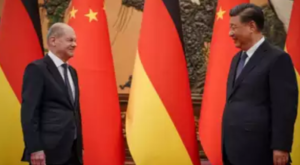Scholz’s China Visit: Economic Strains Amid Ukraine Crisis
German Chancellor Olaf Scholz embarked on a visit to China on Sunday, emphasizing the growing economic tensions and divergences over Russia’s invasion of Ukraine. Scholz’s initial stop was Chongqing, a key industrial center, where he, accompanied by ministers and business figures, planned to tour a company partially financed by Germany, along with other notable sites in the expansive city known for its role in China’s automotive and various manufacturing sectors.
Deutschland wird alles dafür tun, dass es im Nahen Osten nicht zu einer weiteren Eskalation kommt. Wir können insbesondere den Iran nur warnen. Es ist gut, dass Israel gemeinsam mit seinen Partnern diesen Angriff weitgehend abgewehrt hat.
— Bundeskanzler Olaf Scholz (@Bundeskanzler) April 14, 2024
During his three-day trip, Scholz is set to also tour the financial center of Shanghai before heading to Beijing for meetings with Chinese leader Xi Jinping and Premier Li Qiang.
Germany’s prominent companies like BMW and Volkswagen heavily depend on the Chinese market, yet Beijing’s backing of Russia strains relations with Western nations.
Germany has enjoyed economic advantages from China’s appetite for investment and a wide array of manufactured goods spanning from automobiles to chemicals. However, these ties have weakened due to growing competition from Chinese firms and stricter regulations. Additionally, political interventions have contributed to a significant decline in foreign investment.
German-China Trade Dynamics and Scholz’s Ukraine Solidarity
German companies have raised concerns about facing unfair market barriers in China, prompting the government to advocate for a “de-risking” policy to lessen dependence on the Chinese market and suppliers.
Despite these efforts, China maintained its position as Germany’s top trading partner for the eighth consecutive year in 2023, with 254.1 billion euros ($271 billion) in goods and services exchanged between the two countries. This figure slightly exceeded Germany’s trade with the U.S., but represented a 15.5% decrease from the previous year. According to Germany’s Federal Statistical Office, German exports to China amounted to 97.3 billion euros ($104 billion). However, precise figures have varied due to fluctuations in exchange rates and rounding of numbers.

Footage aired by Chinese state broadcaster CCTV depicted Scholz disembarking from his plane in Chongqing and departing in a motorcade, but omitted any remarks made to the welcoming delegation.
Before his arrival, Scholz shared on the social platform X that he had engaged in discussions with Ukrainian President Volodymyr Zelenskyy regarding the “massive” Russian air attacks on civilian energy infrastructure. He declared Berlin’s unwavering support for Ukraine, stating that Germany will “stand unbreakably by Ukraine’s side.”
China, in contrast, has refrained from criticizing Russian aggression. The country has maintained its trade relations with President Vladimir Putin’s government and aligned its foreign policy with Moscow, opposing the U.S.-led liberal political order. China has advocated for its authoritarian one-party system as a preferable alternative.
Scholz’s China Trip: Bosch Tour, Meetings with Xi and Li, Diplomatic Engagement
After touring a hydrogen motor production facility operated by the German company Bosch, Scholz explored the city alongside young architects. His itinerary included a boat cruise on the renowned Yangtze River, one of the two powerful waterways that partially encircle the city, set against the backdrop of overlooking cliffs.
Following his visit to Shanghai on Monday, Scholz is scheduled to fly to Beijing. There, he will meet with President Xi Jinping on Tuesday at the Diaoyutai State Guesthouse, followed by a reception with military honors by Premier Li Keqiang at the Great Hall of the People, the ceremonial legislature’s seat in the heart of the Chinese capital. Additional visits and meetings are planned before his departure late Wednesday night.
This marks Scholz’s second trip to China since assuming office as chancellor in late 2021. His previous visit, in November 2022, was abbreviated to a one-day trip due to the stringent COVID restrictions in place at the time.
This visit also marks Scholz’s first since the German government unveiled its China strategy last year, which drew criticism from Beijing. Premier Li and a delegation of senior officials visited Berlin in June, signaling ongoing diplomatic engagement between the two nations.










